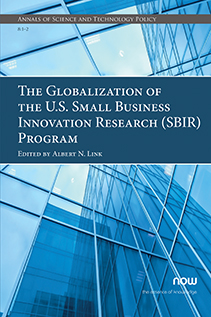The Small Business Innovation Research Program in Australia
By David B. Audretsch, Indiana University, USA | Allan O’Connor, University of South Australia, Australia, Allan.OConnor@unisa.edu.au
Abstract
To enhance both innovation in national defence and the competitiveness and innovative performance of small and medium-sized enterprises (SMEs), the Small Business Innovation Research for Defence (SBIRD) was established by the Australian government in 1996. The goal of the SBIRD was to enhance specific challenges prioritized by the Government for Defence, and to enhance emerging technologies and in particular disruptive technologies. The SBIRD consists of two phases, similar to the U.S. SBIR program. Sufficient time has not elapsed for systematic evaluations and analyses of the impact of the program.
The Globalization of the U.S. Small Business Innovation Research (SBIR) Program
The Globalization of the U.S. Small Business Innovation Research (SBIR) Program presents how SBIR programs have spread across the globe. The U.S. SBIR program has become a template for legislation in other countries that seek to enhance the innovative nature of small firms. This special issue presents works by leading eminent scholars who describe individually the population of international emulated programs. The works are ordered by the date that the country adopted an SBIR-like program, including Turkey (1995), Australia (1996), Brazil (1997), South Korea (1998), Japan (1999), Taiwan (1999), United Kingdom (2001), The Netherlands (2004), and New Zealand (2012).

Companion
Annals of Science and Technology Policy, Volume 8, Issue 1-2 Special Issue: The Globalization of the U.S. Small Business Innovation Research (SBIR) Program
See the other articles that are also part of this special issue.